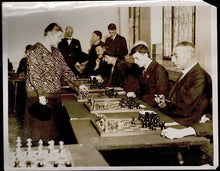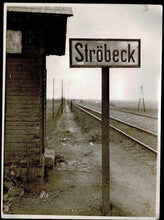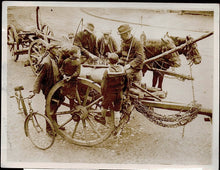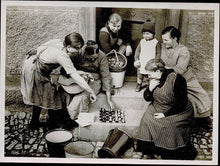
Author: Vera Frantsevna Menchik (1906-1944)
Year: 1931
Publisher: Keystone View Company
Place: Berlin and New York
Description:
5 photographs in varying size and subject. Vera Menchik black and white photo Oblong octavo (8" x 10") with Menchik standing while playing 20 players in exhibition.
Vera Menchik was a Russian-born British-Czechoslovak chess player who became the first women's world chess champion. She also competed in tournaments with some of the world's leading male chess masters, with occasional successes including two wins over future world champion Max Euwe.
Photograph with rail sign of Strobeck and three additional photographs relating to the game of chess. The Holy Roman Emperor, Henry II, suspecting Gunzelin of conspiring against him, had him arrested and imprisoned in Ströbeck where, guarded by the local farmers, he languished for 8 years. During his sentence, legend has it, he spent his time in prison playing chess and, in order to have opponents, taught the game to the citizens of Ströbeck. At any rate, we know for certain, as noted above, that by 1616 chess had long been established in Ströbeck and their reputation already fixed. Legend also suggests that in 1744 Frederick the Great, en route to Frankfort-on-the-Main, visited Ströbeck and being a chess-lover, challenged the mayor to a game. The king lost his game and gave orders for an emissary to be sent to the village every year to play a game in the public square with the strongest village player. Should the emissary lose his game, the village would be exempt from taxes for that year.
Condition:
Edge wear with some chips to corners else very good.








